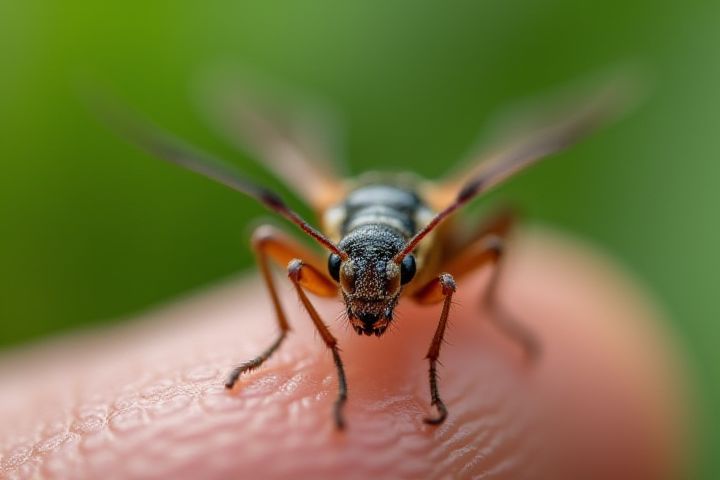
Yes, house pests can be controlled naturally through various methods. Essential oils such as peppermint and lavender serve as effective repellents, deterring insects without harmful chemicals. Implementing diatomaceous earth creates a barrier for crawling pests, as its sharp particles damage their exoskeletons. Maintaining cleanliness by regularly vacuuming and sealing food can significantly reduce pest attraction in your home. Utilizing natural predators, like ladybugs for aphids, can also help maintain balance in your indoor ecosystem.
Can House Pests Be Controlled Naturally
Use essential oils as repellents
Essential oils, derived from plants, are effective natural repellents for various house pests, including ants, spiders, and mosquitoes. Oils such as peppermint, tea tree, and lavender not only emit strong scents that deter insects but also possess antimicrobial properties, enhancing indoor air quality. You can easily create a homemade pest repellent by mixing essential oils with water and a carrier oil in a spray bottle, allowing you to target specific areas. Incorporating these natural solutions into your pest management routine promotes a healthier living environment while minimizing reliance on chemical pesticides.
Introduce beneficial insects
Introducing beneficial insects is an effective and natural method for controlling house pests. For instance, ladybugs are excellent at targeting aphids, while predatory mites can help manage spider mites and thrips. By creating an inviting habitat in your garden or indoor plants, you can attract and sustain these helpful insects, which act as natural pest controllers without the need for harmful chemicals. Your environment will benefit from a balanced ecosystem, enhancing plant health and reducing pest problems organically.
Employ diatomaceous earth
Diatomaceous earth serves as an effective natural pest control method, utilizing its fine, powdery texture derived from fossilized algae. When applied in areas where pests frequent, such as kitchens or gardens, it can desiccate the exoskeletons of insects, effectively dehydrating and eliminating them without harmful chemicals. This non-toxic solution is safe for both humans and pets, making it an ideal choice for those seeking environmentally friendly alternatives to conventional pesticides. By incorporating diatomaceous earth into your pest management routine, you can create a healthier living space while efficiently tackling unwanted infestations.
Utilize natural traps
Natural traps are an effective method for controlling house pests without the need for harmful chemicals. For instance, a simple mixture of sugar and baking soda can be used to attract and kill ants, while a bowl of soapy water can trap fruit flies. You can also create a homemade rodent trap using a bucket and a slight incline, luring mice with bait like peanut butter. These eco-friendly solutions not only reduce pest populations but also minimize risks to your health and the environment.
Maintain a clean environment
Maintaining a clean environment is crucial for effectively controlling house pests naturally. Regularly vacuuming carpets and upholstery, and promptly disposing of food waste minimizes attractants for insects and rodents. Sealing cracks and crevices in walls and around windows further reduces entry points for pests, ensuring your home remains a less hospitable place for them. You can also utilize natural deterrents like essential oils in cleaned areas to discourage pest presence while promoting a healthy living space.
Apply vinegar solutions
Vinegar solutions provide a natural and effective method for controlling house pests, particularly ants and spiders. A mixture of equal parts vinegar and water can disrupt pheromone trails left by ants, helping to deter their presence in your home. For spider control, a vinegar solution can effectively eliminate existing webs and serve as a repellent due to its strong odor. Regular application of vinegar in areas where pests are commonly found can significantly reduce their activity, ensuring a cleaner, pest-free environment.
Seal entry points
Controlling house pests naturally involves sealing entry points effectively to prevent their access. Cracks and gaps around windows, doors, and foundations should be inspected and sealed with materials like caulk or weatherstripping, which can reduce pest infiltration by up to 90%. Using steel wool or copper mesh to block larger openings ensures that rodents and other pests cannot squeeze through. By implementing these measures, you can create a less inviting environment for pests, promoting a healthier home ecosystem.
Cultivate pest-repellent plants
Cultivating pest-repellent plants in your garden is an effective natural method for controlling house pests. For example, marigolds contain pyrethrum, a natural insect repellent, which can deter aphids and nematodes. Incorporating plants like basil and mint not only enhances your culinary use but also repels flies and mosquitoes. By strategically planting these species around your home, you can create a natural barrier against pests without relying on chemical pesticides.
Utilize boric acid
Boric acid is a powerful, natural insecticide commonly used to control various house pests, including cockroaches, ants, and termites. When ingested by these pests, boric acid disrupts their digestive systems and leads to dehydration, ultimately resulting in their death. To effectively utilize boric acid, mix it with equal parts sugar and water to create a bait that attracts these nuisances, or apply it in powder form in areas where pests are prevalent. Your commitment to natural pest control not only safeguards your home from chemical exposure but also promotes a healthier living environment.
Implement regular inspections
Implementing regular inspections is crucial for natural pest control in your home. You should check for signs of infestation, including droppings, nests, and damage to food or materials, ideally conducting these inspections monthly. Effective monitoring allows you to identify potential problems early, which is key to minimizing pest populations before they become a larger issue. By maintaining a clean and well-organized living space, including sealing cracks and storing food properly, you create an environment that is less inviting to pests.
